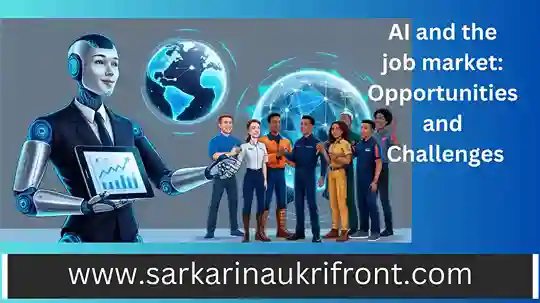AI and the job market: Opportunities and Challenges in 2024!

Introduction
AI and the job market, Artificial Intelligence (AI) is revolutionizing various sectors, and the job market is no exception. From automating repetitive tasks to augmenting human capabilities, AI is reshaping how we work and creating new opportunities and challenges. This article delves into how AI is changing the job market, exploring the opportunities it presents, the challenges it poses, and the skills needed to thrive in this new landscape. For those seeking the latest job opportunities and career advice, visit sarkarinaukrifront.
AI and the job market: The Evolution of AI in the Workplace
Historical Context
The concept of AI has been around for decades, but its practical applications in the workplace have become more pronounced in recent years. Initially, AI was confined to research labs and theoretical discussions. Today, it is integrated into various business processes, transforming industries and job roles.
Current Trends
AI technologies like machine learning, natural language processing, and robotics are now commonplace in many workplaces. Companies use AI to improve efficiency, enhance decision-making, and provide better customer experiences. From chatbots handling customer service inquiries to predictive analytics guiding business strategies, AI is becoming an integral part of the modern workplace.
AI and the job market: Opportunities Created by AI
Job Creation in New Fields
While AI can automate certain tasks, it also creates new job opportunities in emerging fields. Roles such as AI specialists, data scientists, and machine learning engineers are in high demand. These jobs require specialized skills and offer lucrative career paths.
Enhanced Productivity
AI tools can handle repetitive and mundane tasks, freeing employees to focus on more complex and creative activities. This shift enhances productivity and job satisfaction, allowing workers to contribute more strategically to their organizations.
Improved Decision Making
AI can analyze vast amounts of data quickly and accurately, providing insights that help businesses make informed decisions. This capability is particularly valuable in industries like finance, healthcare, and marketing, where data-driven decisions are crucial.
Personalization and Customer Experience
AI enables companies to offer personalized experiences to their customers. By analyzing customer data, AI can tailor recommendations, predict needs, and provide customized solutions, enhancing customer satisfaction and loyalty.
Skill Development and Upskilling
AI also drives the need for continuous learning and skill development. As AI technologies evolve, workers must adapt by acquiring new skills and knowledge. This trend encourages lifelong learning and professional growth.
AI and the job market: Challenges Posed by AI
Job Displacement
One of the most significant concerns about AI is its potential to displace jobs. Automation can replace roles that involve routine tasks, leading to job losses in certain sectors. Workers in these roles must reskill and transition to new positions.
Ethical and Privacy Issues
AI raises ethical and privacy concerns, particularly regarding data usage and decision-making processes. Companies must navigate these issues carefully, ensuring that AI systems are transparent, fair, and respectful of privacy.
Skill Gaps
The rapid adoption of AI has created a skill gap in the workforce. There is a high demand for professionals with expertise in AI and related technologies, but the supply of skilled workers is limited. Bridging this gap requires investment in education and training programs.
Dependency on Technology
Increased reliance on AI can lead to over-dependence on technology. If AI systems fail or are compromised, it can disrupt business operations. Companies must balance the use of AI with robust contingency plans and human oversight.
Bias in AI Systems
AI systems can inadvertently perpetuate biases present in their training data. This issue can lead to unfair outcomes, particularly in areas like hiring and criminal justice. Addressing bias in AI requires careful data selection and ongoing monitoring.
AI and the job market: Sectors Most Affected by AI
Healthcare
AI is transforming healthcare by improving diagnostics, personalizing treatment plans, and automating administrative tasks. AI-powered tools can analyze medical images, predict patient outcomes, and streamline patient care processes, enhancing efficiency and accuracy in healthcare delivery.
Finance
In the finance sector, AI is used for fraud detection, risk assessment, and automated trading. AI algorithms can analyze market trends, identify fraudulent activities, and make investment decisions, providing valuable support to financial professionals.
Manufacturing
AI-driven automation is revolutionizing manufacturing processes. Robots and AI systems can perform tasks like assembly, quality control, and inventory management with high precision and efficiency, reducing production costs and increasing output.
Retail
In retail, AI enhances customer experiences through personalized recommendations, virtual shopping assistants, and inventory management. AI can analyze customer behavior, predict demand, and optimize supply chains, improving overall retail operations.
Education
AI is transforming education by offering personalized learning experiences, automating administrative tasks, and providing data-driven insights. AI-powered tools can adapt educational content to individual learning styles, track student progress, and assist teachers in developing effective teaching strategies.
Transportation
AI is driving innovation in transportation through autonomous vehicles, route optimization, and predictive maintenance. AI algorithms can analyze traffic patterns, predict vehicle maintenance needs, and enhance the safety and efficiency of transportation systems.
AI and the job market: Skills for the AI-Driven Job Market
Technical Skills
To thrive in an AI-driven job market, individuals need to develop technical skills such as programming, data analysis, and machine learning. Proficiency in languages like Python and R, and familiarity with AI frameworks like TensorFlow and PyTorch, are highly valuable.
Analytical Thinking
Analytical thinking is crucial for interpreting data and making informed decisions. Workers must be able to analyze complex information, identify patterns, and draw actionable insights from data.
Adaptability
The rapid pace of technological change requires workers to be adaptable and open to learning. Embracing new technologies and continuously updating skills are essential for staying competitive in the job market.
Communication Skills
Effective communication is vital for collaborating with teams, presenting findings, and explaining AI-driven insights to non-technical stakeholders. Strong written and verbal communication skills are crucial in an AI-enhanced workplace.
Creativity and Problem-Solving
AI can handle routine tasks, but human creativity and problem-solving abilities are irreplaceable. Workers must be able to think creatively, develop innovative solutions, and address complex challenges.
Strategies for Navigating the AI Job Market
Continuous Learning
Lifelong learning is essential for staying relevant in the AI job market. Pursuing advanced degrees, certifications, and online courses can help individuals acquire the skills needed for AI-related roles. Many platforms offer free or affordable courses on AI and related technologies, making it easier for workers to upskill.
Networking
Building a professional network can provide valuable opportunities for learning, mentorship, and job referrals. Attending industry conferences, joining online forums, and participating in AI-related meetups can help individuals connect with peers and experts in the field.
Gaining Practical Experience
Hands-on experience is crucial for developing AI skills. Engaging in projects, internships, and hackathons can provide practical experience and showcase one’s abilities to potential employers. Many companies also offer AI-focused internships and apprenticeships, providing a pathway to gain real-world experience.
Staying Informed
Keeping up with the latest trends and developments in AI is vital for staying competitive. Following industry news, reading research papers, and participating in webinars can help individuals stay informed about emerging technologies and best practices.
Building a Portfolio
Creating a portfolio of AI projects can demonstrate one’s skills and expertise to potential employers. Showcasing projects on platforms like GitHub or personal websites can provide tangible evidence of one’s abilities and accomplishments.
The Role of Governments and Organizations
Government Initiatives
Governments play a crucial role in preparing the workforce for the AI-driven job market. By investing in education, training programs, and research, governments can help bridge the skill gap and ensure that workers are equipped with the necessary skills. Policies that promote innovation, support job transitions, and address ethical concerns are also essential.
Organizational Strategies
Organizations must adapt to the changing job market by investing in AI technologies and reskilling their workforce. Implementing AI-driven tools, fostering a culture of continuous learning, and developing ethical AI practices are crucial for staying competitive. Collaboration between organizations, educational institutions, and governments can create a comprehensive approach to addressing the challenges and opportunities presented by AI.
The Future of Work in an AI-Driven World
Hybrid Work Models
AI will continue to support hybrid work models, combining remote and in-office work. AI-driven tools can enhance collaboration, productivity, and employee well-being, enabling flexible work arrangements that benefit both employers and employees.
Evolving Job Roles
Job roles will continue to evolve as AI technologies advance. New roles will emerge, and existing roles will adapt to incorporate AI-driven tasks and responsibilities. Workers must stay agile and proactive in acquiring new skills to navigate these changes successfully.
Ethical AI Practices
The future of work will require a strong emphasis on ethical AI practices. Organizations must develop transparent, fair, and accountable AI systems, addressing issues like bias, privacy, and security. Ethical AI practices will be essential for building trust and ensuring the responsible use of AI technologies.
Lifelong Learning
Lifelong learning will be a cornerstone of the AI-driven job market. Workers must embrace continuous learning and skill development to stay relevant and competitive. Educational institutions, organizations, and governments must collaborate to create accessible and effective learning opportunities.
Conclusion
AI is undoubtedly transforming the job market, offering both opportunities and challenges. By understanding these changes and proactively adapting, individuals and organizations can thrive in the AI-driven world. For job seekers looking to navigate this evolving landscape and find the best AI-related opportunities, visit sarkarinaukrifront. This platform offers valuable resources and the latest job listings to help you thrive in the future of work.
